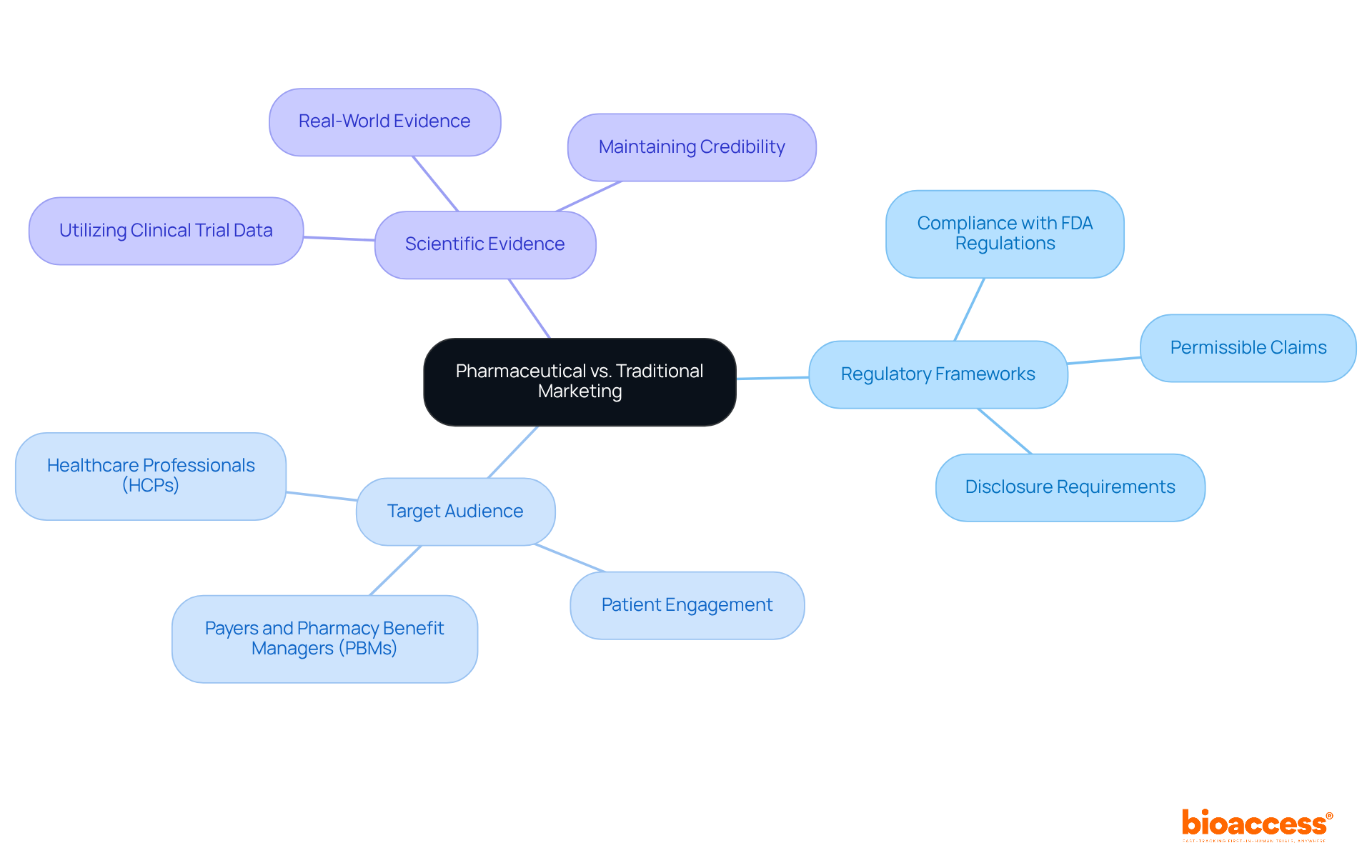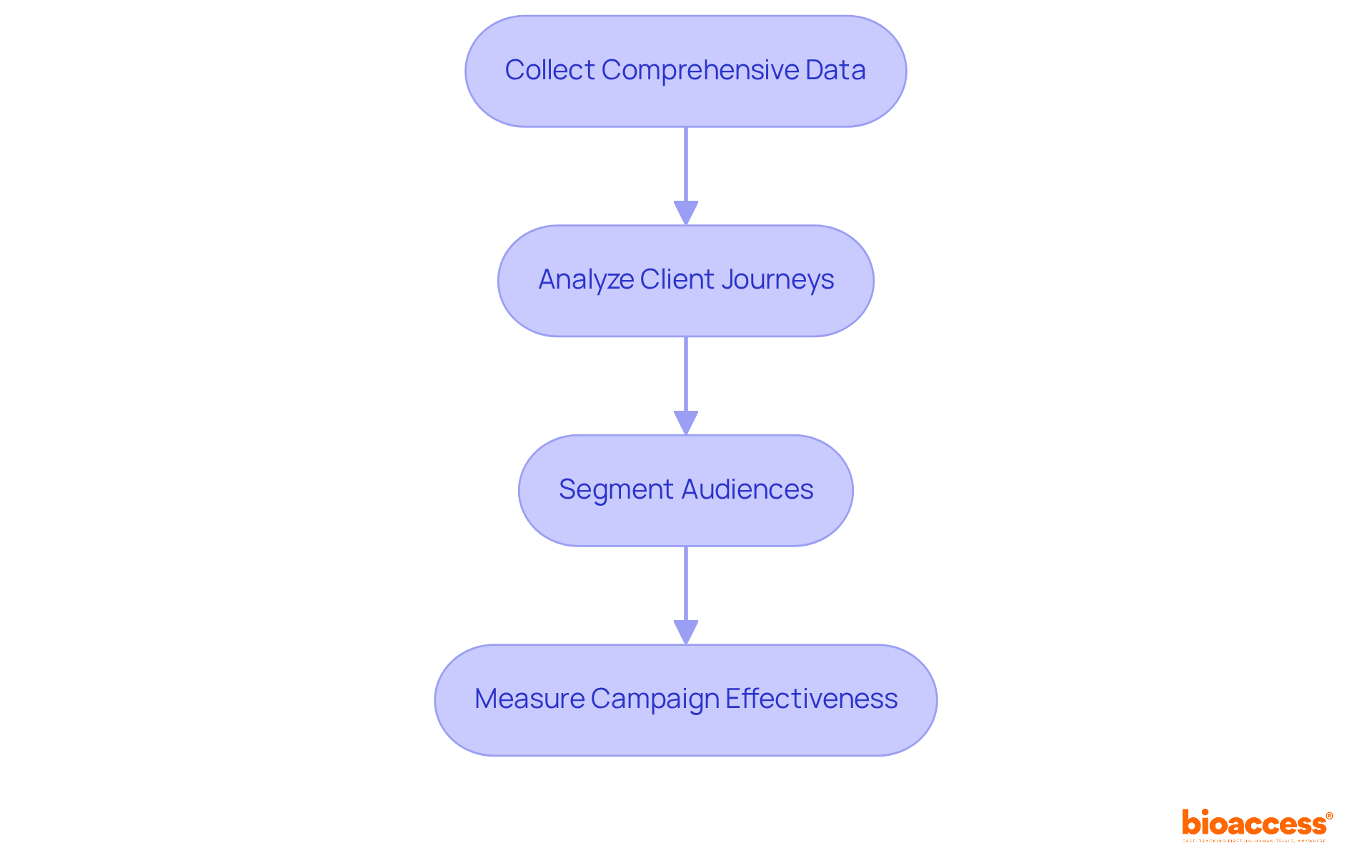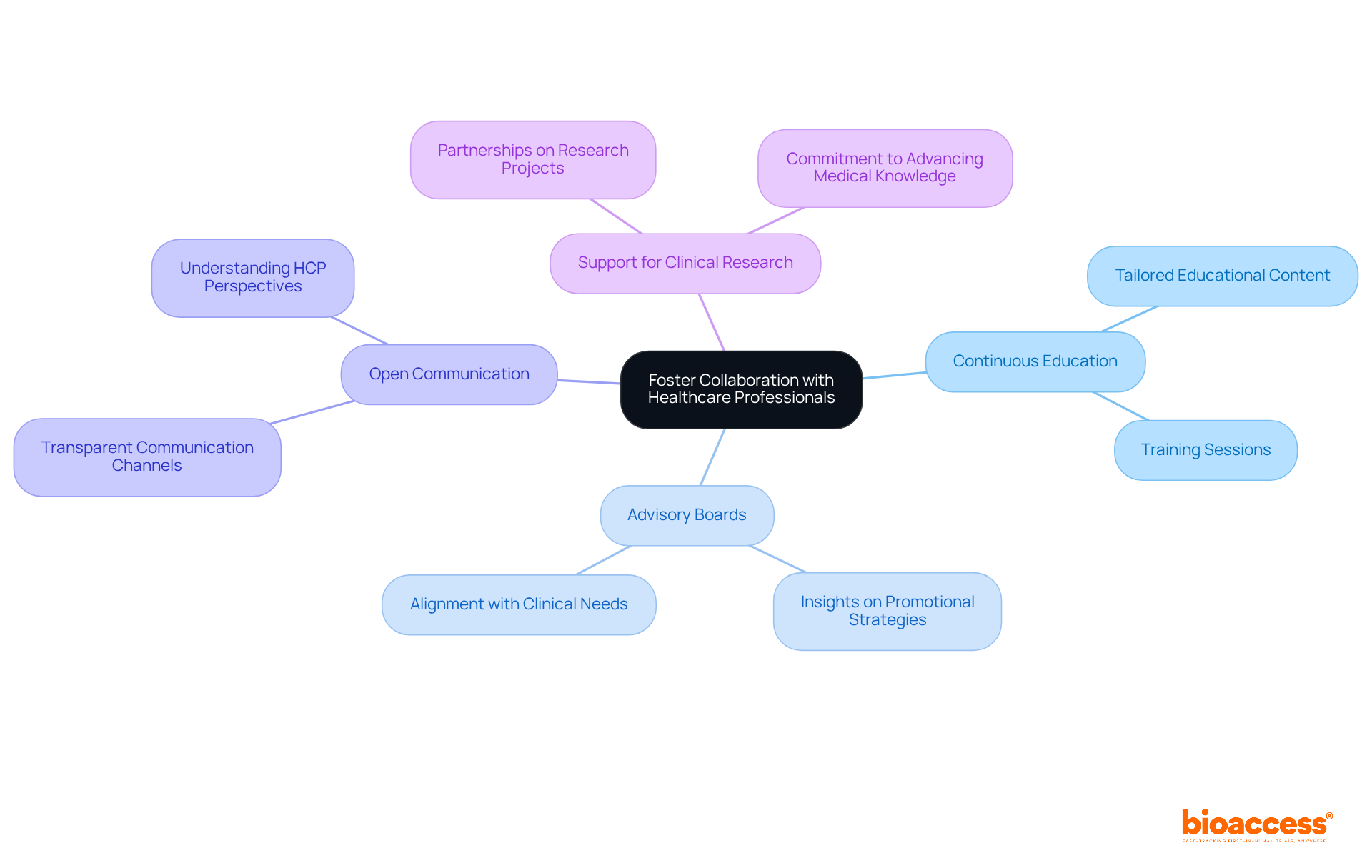Overview
Strategic pharmaceutical marketing distinctly diverges from traditional marketing by prioritizing adherence to regulatory standards and focusing on healthcare professionals rather than the general public. This article delineates essential practices, including:
- A thorough understanding of regulatory frameworks
- The strategic use of scientific evidence
- The cultivation of collaborative relationships with healthcare providers
Such efforts are crucial for ensuring effective communication and improving health outcomes. By illustrating how these tailored strategies are indispensable for achieving success in the pharmaceutical industry, the article underscores the critical nature of compliance and targeted engagement.
Introducción
Pharmaceutical marketing operates within a distinct landscape, characterized by stringent regulations and ethical considerations that differentiate it from traditional marketing strategies. This article explores the essential strategies that pharmaceutical companies can implement to navigate these complexities effectively, emphasizing compliance, targeted communication, and the integration of data analytics.
However, a significant challenge persists: how can these organizations balance regulatory demands with the necessity to engage healthcare professionals and patients in a meaningful manner? By examining this tension, we uncover key practices that not only bolster brand reputation but also contribute to enhanced health outcomes.
Differentiate Pharmaceutical Marketing from Traditional Marketing
Pharmaceutical promotion is fundamentally distinct from traditional promotion due to its rigorous regulatory environment and the ethical considerations it entails. While conventional promotion frequently seeks wide consumer attraction, drug promotion must emphasize compliance with regulations set by organizations like the FDA and EMA. This includes ensuring that all promotional materials are scientifically accurate and not misleading, focusing on presenting a fair balance of risk and effectiveness information.
To effectively navigate the complexities of pharmaceutical marketing, companies should:
- Understand Regulatory Frameworks: Familiarizing oneself with the specific regulations governing pharmaceutical advertising in target markets is crucial. This encompasses comprehending permissible claims about products and the necessary disclosures required in advertisements.
- Target Healthcare Professionals: Unlike conventional promotion, which addresses the general public, drug promotion primarily focuses on healthcare professionals (HCPs) who prescribe medications. Crafting tailored messages for this audience is essential for effective communication.
- Utilize Scientific Evidence: Leveraging clinical trial data and real-world evidence is vital to support promotional claims. All communications should be grounded in robust scientific research to maintain credibility and compliance.
By recognizing these differences, pharmaceutical marketers can create strategies for strategic pharmaceutical marketing that not only comply with regulatory standards but also connect with their target audience. This ultimately results in enhanced health outcomes and a strengthened brand reputation.

Implement Patient-Centric Marketing Strategies
Applying consumer-focused marketing strategies necessitates a profound comprehension of individuals' needs, preferences, and behaviors. This method not only encourages involvement but also nurtures trust and loyalty among individuals receiving care. Key practices include:
- Conduct Patient Research: Employ surveys, focus groups, and interviews to gather direct insights from patients regarding their experiences, preferences, and challenges related to treatment. This data is invaluable for customizing promotional efforts. For example, the case study 'Dignity and Empathy in Care' emphasizes how comprehending emotional well-being can improve trust and results.
- Personalize Communication: Tailor marketing messages to address the specific needs and concerns of different audience segments. Creating educational material that connects with individuals' experiences can greatly improve engagement. As noted, "Patients don't care how much you know until they know how much you care," emphasizing the importance of empathy in communication.
- Leverage Digital Platforms: Utilize social media, mobile applications, and websites to connect with individuals in their preferred environments. Providing valuable resources and support through these channels can greatly enhance interaction and satisfaction for individuals. Statistics indicate that effective patient-focused promotion can result in a 164% rise in inbound sales.
- Promote Client Input: Set up systems for clients to express their opinions on promotional content and campaigns. This not only enhances future promotional efforts but also indicates that the organization values consumer input and experiences. Studies show that businesses concentrating on client experience can attain a 381% ROI in the first quarter.
By emphasizing the experience of individuals and steering clear of typical mistakes like overlooking feedback or not personalizing communication, firms in the drug industry can utilize strategic pharmaceutical marketing to create more effective promotional strategies that enhance health results and increase satisfaction among individuals.

Leverage Data Analytics for Targeted Marketing
Data analytics plays a crucial role in strategic pharmaceutical marketing, enabling firms to customize their strategies based on real-time insights. To effectively leverage data analytics, companies should:
- Collect Comprehensive Data: Gather data from various sources, including sales figures, patient demographics, and engagement metrics from digital platforms. This holistic approach ensures a well-rounded understanding of market dynamics. As Kadambari Bendre observes, "By utilizing data, pharma advertisers make evidence-based choices, leading to enhanced resource utilization, increased engagement, and more pertinent promotional campaigns."
- Analyze Client Journeys: Use analytics to outline client experiences, identifying key touchpoints where promotional efforts can be most effective. Insights from individual journey analytics assist in recognizing obstacles to therapy adoption, facilitating targeted interventions that improve support and adherence.
- Segment Audiences: Utilize data to create detailed patient segments based on demographics, treatment history, and preferences, allowing for more focused promotional campaigns. Effective segmentation and targeting of healthcare professionals (HCPs) are crucial for maximizing influence within regulatory constraints.
- Measure Campaign Effectiveness: Implement analytics tools to track the performance of promotional campaigns, enabling continuous improvement based on what works best. According to a Deloitte study, 46% of missed drug launch forecasts were due to an inadequate understanding of the market and customer needs, highlighting the importance of measuring campaign effectiveness.
By incorporating data analytics into their strategic pharmaceutical marketing, drug companies can enhance their targeting efforts, improve engagement, and ultimately achieve better outcomes for individuals. This approach not only fosters deeper patient engagement but also aligns with the industry's shift towards data-driven decision-making.

Foster Collaboration with Healthcare Professionals
Collaboration with healthcare professionals (HCPs) is essential for effective strategic pharmaceutical marketing. Involving HCPs not only provides valuable insights but also enhances the credibility of promotional initiatives. To foster this collaboration, key practices include:
- Continuous Education: Offering educational resources and training sessions allows HCPs to remain informed about the latest advancements in treatments and therapies, which is vital in 2025's rapidly evolving healthcare landscape. As Patricia Gee notes, "Relevance and personalization are critical," highlighting the necessity for tailored educational content.
- Advisory Boards: Establishing advisory boards comprised of HCPs enables organizations to gather insights on promotional strategies and product development, ensuring alignment with clinical needs and enhancing the significance of their messaging. Bioaccess®'s Advisory Board, which includes experts across various therapeutic areas, plays a crucial role in this process, utilizing expertise to accelerate clinical trial initiatives and improve engagement. This approach can significantly boost promotional effectiveness, as emphasized by Marc Peidro, who states, "A coordinated approach improves engagement, reduces redundancy, and drives better ROI."
- Open Communication: Sustaining transparent communication channels with HCPs assists companies in understanding their perspectives and integrating their insights into marketing initiatives, fostering trust and collaboration. A survey indicates that 68% of HCPs disregard emails unless the content feels personally relevant, underscoring the importance of tailored communication strategies.
- Support for Clinical Research: Partnering with HCPs on clinical research projects demonstrates a commitment to advancing medical knowledge and improving care for individuals, further solidifying the partnership. Case studies like the 'Power of Trust-Based Education' illustrate how effective education can enhance trust and engagement.
By prioritizing collaboration with HCPs and steering clear of common pitfalls such as generic messaging, pharmaceutical companies can implement strategic pharmaceutical marketing strategies that resonate with healthcare providers and patients alike, ultimately leading to improved health outcomes.

Conclusión
In conclusion, strategic pharmaceutical marketing is distinct from traditional marketing, necessitating innovative practices that prioritize patient engagement and collaboration with healthcare providers. This approach not only ensures compliance with regulatory standards but also contributes positively to the healthcare ecosystem.
The imperative for companies is clear: they must invest in understanding their audiences and leverage data-driven insights to refine their marketing strategies. By doing so, organizations position themselves at the forefront of this dynamic industry, enhancing health outcomes and strengthening brand reputation.
The call to action is evident: embrace these strategies to effectively resonate with target audiences and navigate the complexities of the pharmaceutical landscape.
Frequently Asked Questions
How does pharmaceutical marketing differ from traditional marketing?
Pharmaceutical marketing is distinct due to its rigorous regulatory environment and ethical considerations. Unlike traditional marketing, which aims for broad consumer appeal, pharmaceutical promotion must comply with regulations from organizations like the FDA and EMA, ensuring that all materials are scientifically accurate and present a fair balance of risk and effectiveness.
What are the key regulatory considerations in pharmaceutical marketing?
Key regulatory considerations include understanding the specific regulations governing pharmaceutical advertising in target markets, permissible claims about products, and necessary disclosures required in advertisements.
Who is the primary target audience for pharmaceutical marketing?
The primary target audience for pharmaceutical marketing is healthcare professionals (HCPs) who prescribe medications, as opposed to the general public targeted by conventional promotion.
Why is scientific evidence important in pharmaceutical marketing?
Scientific evidence is crucial in pharmaceutical marketing because it supports promotional claims and ensures that communications are grounded in robust scientific research, which helps maintain credibility and compliance with regulations.
What strategies can pharmaceutical marketers use to connect with their target audience?
Pharmaceutical marketers can create strategies that comply with regulatory standards while effectively communicating with healthcare professionals by understanding the regulatory frameworks, targeting HCPs with tailored messages, and utilizing scientific evidence in their promotional materials.
List of Sources
- Differentiate Pharmaceutical Marketing from Traditional Marketing
- FDA Begins Crackdown on Direct-to-Consumer Pharmaceutical Advertising (https://lw.com/en/insights/fda-begins-crackdown-on-direct-to-consumer-pharmaceutical-advertising)
- Pharmaceutical Marketing in the U.S. vs. Traditional Industries | IntuitionLabs (https://intuitionlabs.ai/articles/pharma-marketing-vs-traditional-industries)
- Pharmaceutical Marketing Challenges & Trends to Expect on 2025: According to KOLs | PharmExec (https://pharmexec.com/view/pharmaceutical-marketing-challenges-trends-2025-according-to-kols)
- How is Marketing in Pharma Different? - Pharma Marketing Network (https://pharma-mkting.com/featured/how-is-marketing-in-pharma-different)
- HHS, FDA to Require Full Safety Disclosures in Drug Ads (https://hhs.gov/press-room/hhs-fda-drug-ad-transparency.html)
- Implement Patient-Centric Marketing Strategies
- 10 inspirational quotes for the pharma sector (https://pharmaceuticalmanufacturer.media/pharmaceutical-industry-insights/10-inspirational-quotes-for-the-pharma-sector)
- The Power of Patient Testimonials in Healthcare Marketing (https://socialclimb.com/blog/the-power-of-patient-testimonials-in-healthcare-marketing)
- 10 Patient Experience Quotes for Inspiration (https://carecloud.com/continuum/patient-experience-quotes-for-inspiration)
- 10 Inspiring Patient Experience Quotes | Relias (https://relias.com/blog/patient-experience-quotes)
- Patient Engagement Quotes: For Every Purpose & Audience (https://nclusiv.co.uk/blog/f/patient-engagement-quotes-for-every-purpose-audience)
- Leverage Data Analytics for Targeted Marketing
- Pharma Marketing Analytics: How Data Drives Pharma Success (https://improvado.io/blog/pharma-marketing-analytics-guide)
- 2025 Pharma Marketing Trends to Watch | Healthgrades Partner Solutions (https://b2b.healthgrades.com/insights/blog/2025-marketing-trends)
- How Data-Driven Marketing is Transforming Pharma Growth (https://pharmanow.live/marketing/data-driven-marketing-pharma)
- Pharma Marketing Analytics for Effective Campaign Strategies (https://wns.com/perspectives/articles/articledetail/1025/how-analytics-is-powering-pharma-marketing-in-the-new-normal)
- 2025 Pharma Marketing Trends: Embracing Digital Transformation and Patient-Centric Approach (https://p360.com/connect/pharma-marketing-trends-2024)
- Foster Collaboration with Healthcare Professionals
- 100 quotes: What they reveal about the state of healthcare advertising (https://mmm-online.com/home/channel/features/100-quotes-what-they-reveal-about-the-state-of-healthcare-advertising)
- Healthcare Marketing Strategy for 2025 Success (https://pharma-mkting.com/featured/healthcare-marketing-strategy-cutting-through-digital-clutter-in-2025)
- HCP Engagement: Emerging Trends, Success Metrics & Omnichannel Strategies [2025] (https://onomi.io/blog/hcp-engagement-emerging-trends-success-metrics-and-omnichannel-strategies)
- Unlocking the Future of Customer Engagement in Pharma (https://deloitte.com/ch/en/Industries/life-sciences-health-care/analysis/unlocking-the-future-of-customer-engagement-in-pharma.html)
- 10 inspirational quotes for the pharma sector (https://pharmaceuticalmanufacturer.media/pharmaceutical-industry-insights/10-inspirational-quotes-for-the-pharma-sector)






